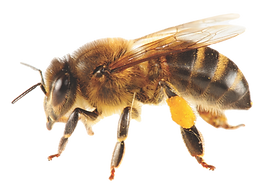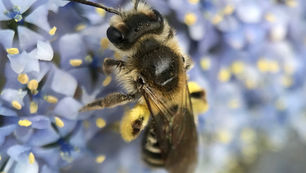

Bees

We offer a discreet same day 24hr response throughout the North West

All completed treatments come with our extended 6 month guarantee
Find it cheaper elsewhere & we'll match the price, plus an additional 10% off
All staff are accredited to RSPH Level 2 standard & are DBS checked annually
Bee Control & Removal
Contrary to popular belief, bees aren't protected and can be treated. Bees are generally better natured than wasps, however, can still sting if agitated & provoked.
The decision to treat will depend if it is possible to close the entrance(s) to the nest after treatment. In this circumstance it is essential that you use a trained professional. We have the technical knowledge and access to a range of professional use insecticides which are not available to the public.
Post-treatment requirements will vary depending on the species of bees you have. For bumblebees and tree bees, blocking up access points will prevent non-target bees from entering and getting contaminated, as well as shortening the likelihood of other bees accessing the same area in the future.
For solitary / masonry bees, in the long-term, re-pointing with mortar may be necessary. However, this must be thorough as bees hunting for a nest site will soon locate areas that have been missed.
For honey bees, it is essential that entrance points or blocked off, and if possible remove all the honeycomb. Failure to do this will cause 'robber bees' to find the infected honey and take it back to their hive, thus contaminating it.

1. Contact
Call us for your quote & we can have a technician attend within 24 hours
Local specialists
`Open 7am - 8pm
Discreet service

2. Survey
If necessary, we can arrange a surveyor to inspect your property
Convenient times
RSPH qualified
Free bee survey

3. Treatment
Local accredited technician will come out to provide your treatment
Tailored treatments
Child & pet friendly
Immediate results

4. Aftercare
We'll make as many visits as required until your problem is resolved
Full eradication
Pest identification
Peace of mind
Species of Bee
We've listed some of the most common bees here. Different types of bee may require different treatment methods;
-
Honey bee - Now mostly live in hives of up to 20,000 individuals, and are commonly found feeding on open flowers they can easily reach with their short tongues.
-
Tree bumble bee - Easily identified by their ginger thorax, black abdomen and white tail, tree bumblebees are one of our most common species.
-
Masonry bee - Look a little similar to some mining bee species, but you can tell them apart by their boxy heads and large powerful jaws.
-
Miner bee - This solitary species nests in the ground and is part of the Andrena genus; a 67-strong group of diverse bees ranging from 5 – 17mm long.
Did you know that there are more than 25,000 different species of bee in the world? These types of bee can be divided into about 4000 genera and nine groups of bee families. According to statistics, there are more than 250 species of bee in the UK. If you have spotted bees at your property, we recommend leaving them alone and get in touch with us to discuss further.








Miner Bees

Tree Bumble Bees

Honey Bees

Masonry Bees

Solutions to Eradicating Bees
Our RSPH qualified technicians provide safe, effective solutions to get rid of bees, using industry-leading treatments. If you have spotted any of the signs above, you should arrange for professional treatments to get rid of bees quickly.
Call us today on 0800 107 8741 and have a chat with one of our trained staff members for more advice & to get your quote.
